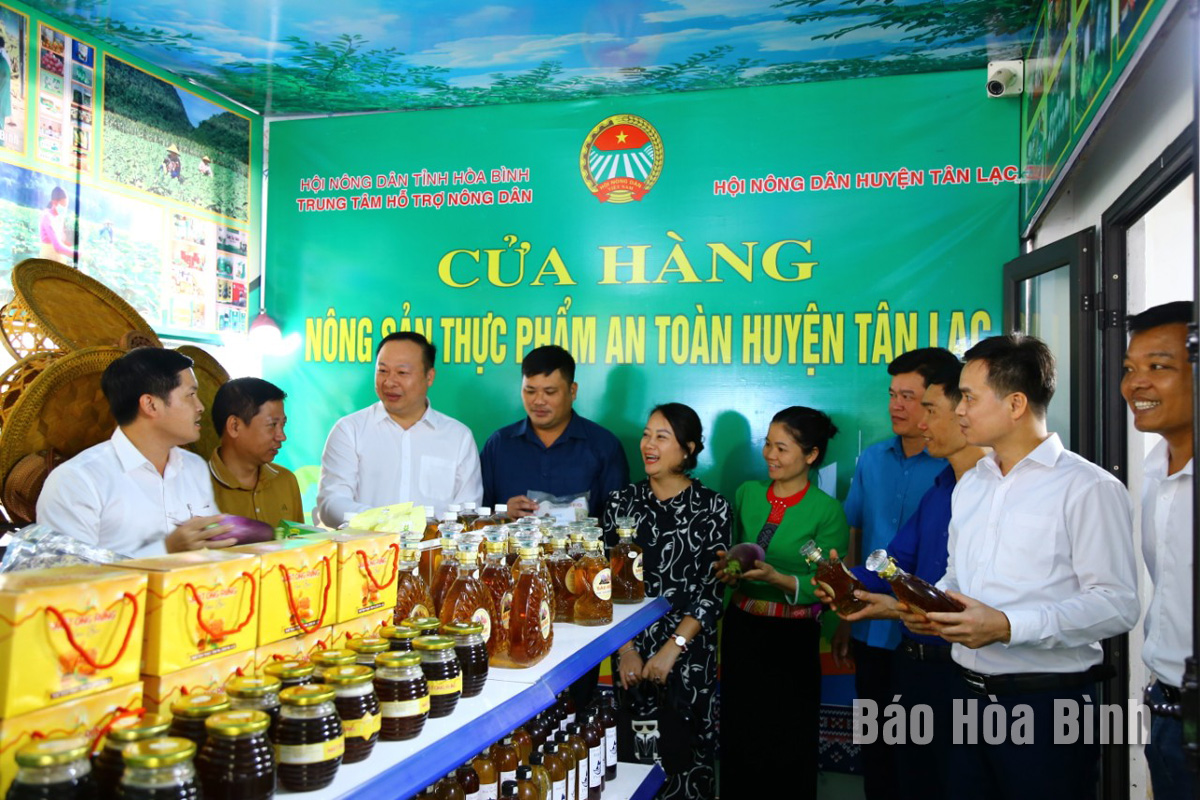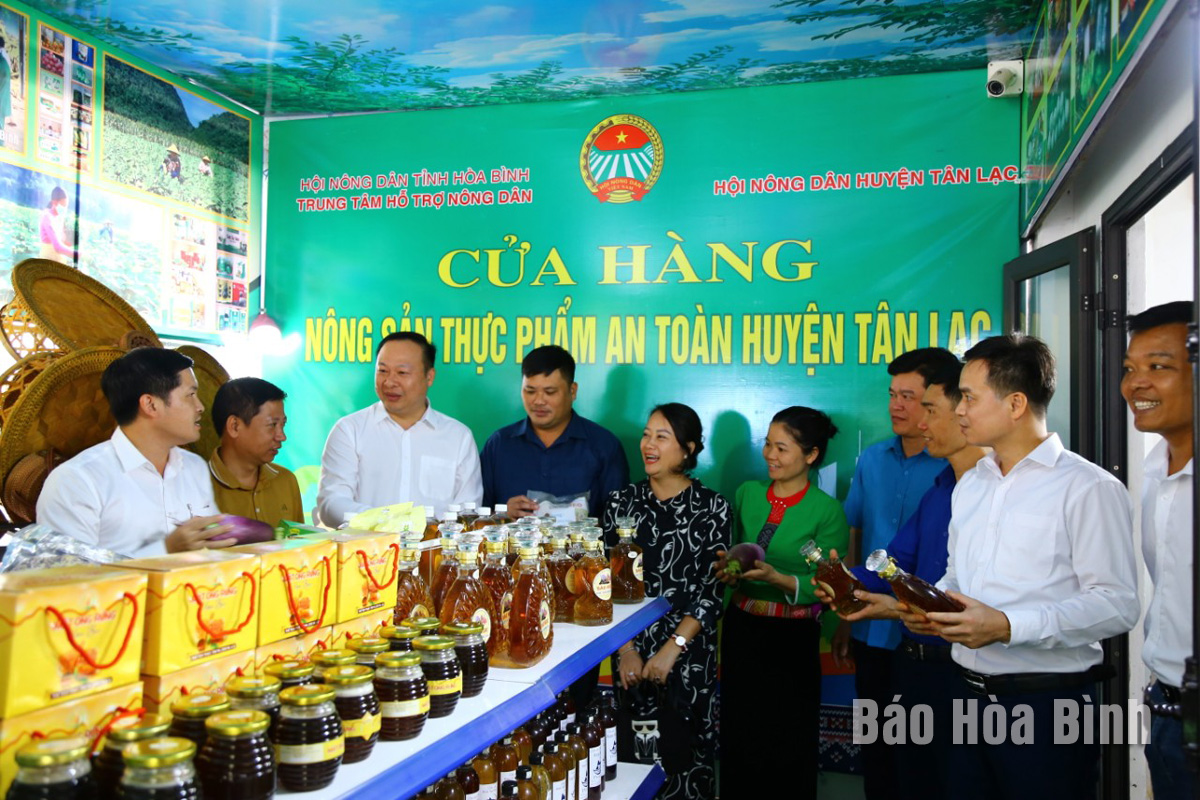
"Behind every One Commune One Product (OCOP)-starred product lies a quietly operating support system: technical staff, experts, trade fairs, and e-commerce platforms. OCOP cannot go far without forward-looking policy support," affirmed Nguyen Huy Nhuan, Director of the Department of Agriculture and Environment of Hoa Binh province.
A safe agricultural products store in Tan Lac district.
From 2018 to 2020, the initial phase of the OCOP programme, Hoa Binh province mobilised over 47.5 billion VND to support its implementation. According to Nhuan, this funding came mainly from the National Target Programme for New-Style Rural Development, the local budget, and integration with other socio-economic development projects. The province prioritised products with strong market potential, stable supply chains, and distinctive cultural identity.
To ensure sustainability, major provincial programmes were designed to support OCOP in parallel. Notably, Resolution No. 01-DA/TU by the provincial Party Committee's Standing Board (2021) supports farmer members in agricultural production and product consumption. Other relevant projects include Resolution No. 03-DA/TU on agricultural development aligned with new-styled rural construction and the 2021–2025 tourism development plan. Thanks to this integration, OCOP stakeholders benefit not only from specialised policies but also from additional resources such as infrastructure, training, trade promotion, interest rate subsidies, and land access.
District-level administrations are also encouraged to allocate their own budgets for the OCOP programme. Districts such as Luong Son, Tan Lac and Kim Boi took the initiative to use funds from agricultural and cooperative economic development to support packaging upgrades, label printing, facility construction, and cold storage for cooperatives with OCOP products. In some areas, district leaders even worked directly with banks to resolve credit challenges for producers.
With timely and targeted financial support, many OCOP products in Hoa Binh have made notable progress. Their raw material zones have been stabilised, processing lines upgraded, and quality certifications such as VietGAP and HACCP achieved.
Aiming to shift local specialties from "homemade thinking" to a market-oriented mindset, Hoa Binh has launched diverse trade promotion campaigns, from traditional fairs to e-commerce platforms, from product showcases to export gateways.
Early in the OCOP rollout, the Department of Agriculture and Environment organised business-matching delegations and product promotion events across Northwestern provinces. Hoa Binh also hosted regional OCOP fairs, giving local specialties a platform to shine. Highland markets and annual agricultural fairs in Hoa Binh city attracted thousands of visitors, resulted in consumption contracts, and expanded retail distribution through supermarkets and clean food chains.
When the COVID-19 pandemic broke out, the province swiftly pivoted to digital trade promotion. The provincial Centre for Industrial Promotion and Development Consultancy helped bring OCOP products to platforms such as Postmart, Voso, Shopee, and Sendo. "By the end of 2024, about 3,000 agricultural and OCOP products from Hoa Binh were introduced online, contributing to the sale of over 1,300 tonnes of produce. Some have even secured export orders to the US, Japan, and the EU, unprecedented prior to the OCOP programme, said Duong Quoc Thang, Deputy Director of the Department of Industry and Trade.
The provincial New-style Rural Development Coordination Office played a key role in connecting with e-commerce firms, while technical staff assisted individual households in creating online stores, photographing products, writing descriptions, and adding QR codes.
Currently, there are around 15 safe agricultural product stores across the province, showcasing OCOP and local specialty products. Bui Quoc Hoan, Vice Chairman of the Luong Son district People's Committee, said that in addition to distribution channels, the district prioritises OCOP brand communication. Stakeholders receive support to design professional logos and packaging, complete traceability profiles, and print QR codes and anti-counterfeit labels. All starred products must adhere to the national OCOP brand identity system while maintaining a distinctive regional imprint. Some products are even supported with promotional costs on provincial news outlets, websites, and the Hoa Binh agricultural brand fanpage.
Thanks to strong policy backing, the OCOP brand in Hoa Binh is gaining recognition. More than just high-quality goods, OCOP products have become "cultural ambassadors" of the Muong, Thai and Dao ethnic minority communities, preserved and elevated by the very hands of local people.
According to data from the Hoa Binh Provincial Party Committee, the industrial production index for the first six months of 2025 is estimated to have increased by 20% compared to the same period last year. This marks the highest year-on-year growth rate for this period since 2020.
In the first six months of 2025, Hoa Binh province’s export turnover was estimated at 1.145 billion USD, marking an 18.11% increase compared to the same period in 2024. Import turnover was estimated at $ 804 million, a 17.15% increase, which helped the province maintain a positive trade balance.
The lives of the ethnic minority farmers in Tan Lac district have gradually improved thanks to the new directions in agricultural production. This is a testament to the collective strength fostered through the professional associations and groups implemented by various levels of the district’s Farmers’ Union.
With the motto the "product quality comes first,” after nearly one year of establishment and operation, Muong village’s Clean Food Agricultural and Commercial Cooperative, located in Cau Hamlet, Hung Son Commune (Kim Boi district), has launched reputable, high-quality agricultural products to the market that are well-received by consumers. The products such as Muong village’s pork sausage, salt-cured chicken, and salt-cured pork hocks have gradually carved out a place in the market and they are on the path to obtaining the OCOP certification.
In the past, the phrase "bumper harvest, rock-bottom prices" was a familiar refrain for Vietnamese farmers engaged in fragmented, small-scale agriculture. But today, a new spirit is emerging across rural areas of Hoa Binh province - one of collaboration, organisation, and collective economic models that provide a stable foundation for production.
Maintaining growing area codes and packing facility codes in accordance with regulations is a mandatory requirement for agricultural products to be eligible for export. Recently, the Department of Agriculture and Environment of Hoa Binh province has intensified technical supervision of designated farming areas and packing facilities to safeguard the "green passport" that enables its products to access international markets.



